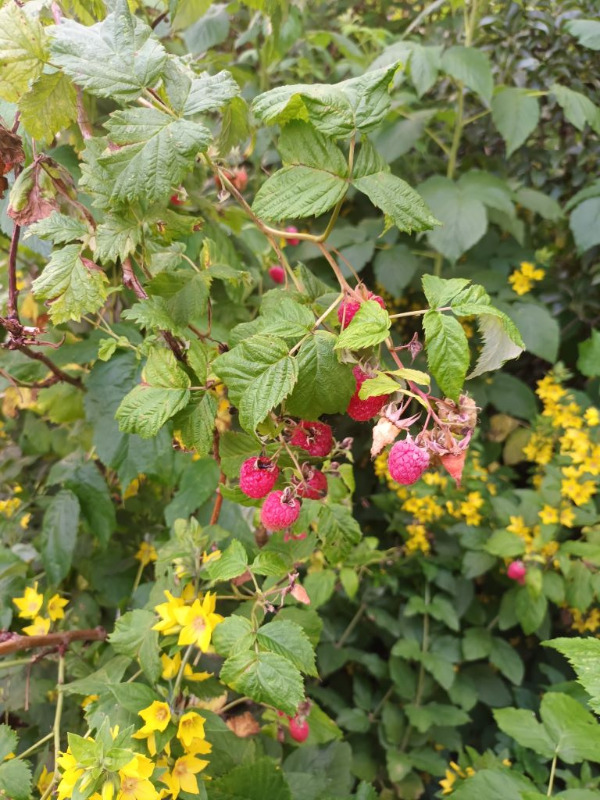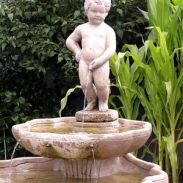- Sanitation systems
- Toilets with urine diversion
- Urine treatment, transport, storage
- Re: Can we recycle human urine to close the nutrient cycle?
Re: Can we recycle human urine to close the nutrient cycle?
17.3k views
- bait
-
- User
Less- Likes received: 0
- AjitSeshadri
-

- Marine Chief Engineer by profession (1971- present) and at present Faculty in Marine Engg. Deptt. Vels University, Chennai, India. Also proficient in giving Environmental solutions , Designation- Prof. Ajit Seshadri, Head- Environment, The Vigyan Vijay Foundation, NGO, New Delhi, INDIA , Consultant located at present at Chennai, India
Re: Can we recycle human urine to close the nutrient cycle?
Dear SuSanA Member Dr HA Pilot
Nice notings on neo STP evolved.
Yes, urine removed separately can be used in a converted form in bio- char absorbed media.
Many members have done your mode STPs
Pl review back issues of old bio septic tanks Etc
Well wishes
Prof Ajit Seshadri
Vels University Chennai India
Nice notings on neo STP evolved.
Yes, urine removed separately can be used in a converted form in bio- char absorbed media.
Many members have done your mode STPs
Pl review back issues of old bio septic tanks Etc
Well wishes
Prof Ajit Seshadri
Vels University Chennai India
Prof. Ajit Seshadri, Faculty in Marine Engg. Deptt. Vels University, and
Head-Environment , VigyanVijay Foundation, Consultant (Water shed Mngmnt, WWT, WASH, others)Located at present at Chennai, India
Head-Environment , VigyanVijay Foundation, Consultant (Water shed Mngmnt, WWT, WASH, others)Located at present at Chennai, India
Please Log in to join the conversation.
You need to login to reply
Here a little update regarding our recent harvest from the cultures I have presented last winter. The plants are fertilized with urine and compost and/or mulch.
Regarding strawberries: Contrary to what is usually done, I grow them permanently on the same spot. This has worked well for me in conjunction with some fertilization of urine (2 liters per square meter and year), a lot of mulch and a bit of compost.
Regarding raspberries: It's a good idea to return the shredded stems of the plants that have finished fruiting on the same spot. Also add 2 liters of urine per square meter and year.
Regarding strawberries: Contrary to what is usually done, I grow them permanently on the same spot. This has worked well for me in conjunction with some fertilization of urine (2 liters per square meter and year), a lot of mulch and a bit of compost.
Regarding raspberries: It's a good idea to return the shredded stems of the plants that have finished fruiting on the same spot. Also add 2 liters of urine per square meter and year.
Hanns-Andre Pitot
M.Eng. Environmental Pollution Control
presently in Seesen, Germany
M.Eng. Environmental Pollution Control
presently in Seesen, Germany
Attachments:
-
 20240619_205509s.jpg
(Filesize: 210KB)
20240619_205509s.jpg
(Filesize: 210KB)
-
 20240620_095206s.jpg
(Filesize: 181KB)
20240620_095206s.jpg
(Filesize: 181KB)
-
 20240621_200109s.jpg
(Filesize: 223KB)
20240621_200109s.jpg
(Filesize: 223KB)
-
 20240619_205528s.jpg
(Filesize: 248KB)
20240619_205528s.jpg
(Filesize: 248KB)
Please Log in to join the conversation.
You need to login to reply
Dear topic author,
Muchas graciaspara su mensaje! Unfortunately, my Spanish is just good enough to read your post. In that earlier post, I was referring to what is known as a small bore sewage system, small bore meaning using piping that is more like what is used in water supply than what is usually used in sewage systems. In order for that to function, solids are kept out of the sewage system,and that is usually performed by the withholding tank, which functions like a septic tank. The outflow of the septic tank is fed into that small bore sewage system. The original reason for such an arrangement was to cut down on the costs of piping, which is very expensive in a regular sewage system. In addition, the gradient of a traditional sewage system is a tricky issue, and pipes easily clog because of the solids. Because of these problems of traditional sewage systems, such small bore systems have been introduced in some countries, and you could probably find out more about that in Susana’s own library.
The other issue is that septic tank systems by themselves, i.e. using a soak-pit in order to discharge the outflow, can heavily pollute the groundwater, depending on the soil, density of usage, etc. Some people are experimenting with collecting urine separately in order to reduce the pollution of the groundwater by septic tank systems (like on Cape Cod in the US). My argument now is that the small bore technology could be another solution, and that this waste water could even be used as a combined irrigation water and fertilizer provided the waste water can be treated to remove pathogens, in particular (and then pumped to where it is needed). And I suggested treatment ponds for that, in particular in countries with high UV radiation (and I think Bolivia would qualify for that).
Ideally, feces would not even get into the waste water (and thus not contaminate the water with pathogens) using some ecological sanitation design, and the treated feces would be collected separately to be composted, but that is just an idea of mine.
What the other contributor was mentioning about salt is true – we are consuming too much salt for a good health; that salt is ending up in the urine and the waste water, and the quality of both is also suffering. There is a similar issue with detergents, which should preferably be 100% biodegradable in order to be sure they are not causing any harm – unfortunately that is rarely the case. That reminds me that I’ve once seen that a particular detergent was advertised to be 93% biodegradable – apparently that is a pretty good figure. But there are detergents that are 100% biodegradable, and that should be the norm!
Muchas graciaspara su mensaje! Unfortunately, my Spanish is just good enough to read your post. In that earlier post, I was referring to what is known as a small bore sewage system, small bore meaning using piping that is more like what is used in water supply than what is usually used in sewage systems. In order for that to function, solids are kept out of the sewage system,and that is usually performed by the withholding tank, which functions like a septic tank. The outflow of the septic tank is fed into that small bore sewage system. The original reason for such an arrangement was to cut down on the costs of piping, which is very expensive in a regular sewage system. In addition, the gradient of a traditional sewage system is a tricky issue, and pipes easily clog because of the solids. Because of these problems of traditional sewage systems, such small bore systems have been introduced in some countries, and you could probably find out more about that in Susana’s own library.
The other issue is that septic tank systems by themselves, i.e. using a soak-pit in order to discharge the outflow, can heavily pollute the groundwater, depending on the soil, density of usage, etc. Some people are experimenting with collecting urine separately in order to reduce the pollution of the groundwater by septic tank systems (like on Cape Cod in the US). My argument now is that the small bore technology could be another solution, and that this waste water could even be used as a combined irrigation water and fertilizer provided the waste water can be treated to remove pathogens, in particular (and then pumped to where it is needed). And I suggested treatment ponds for that, in particular in countries with high UV radiation (and I think Bolivia would qualify for that).
Ideally, feces would not even get into the waste water (and thus not contaminate the water with pathogens) using some ecological sanitation design, and the treated feces would be collected separately to be composted, but that is just an idea of mine.
What the other contributor was mentioning about salt is true – we are consuming too much salt for a good health; that salt is ending up in the urine and the waste water, and the quality of both is also suffering. There is a similar issue with detergents, which should preferably be 100% biodegradable in order to be sure they are not causing any harm – unfortunately that is rarely the case. That reminds me that I’ve once seen that a particular detergent was advertised to be 93% biodegradable – apparently that is a pretty good figure. But there are detergents that are 100% biodegradable, and that should be the norm!
Hanns-Andre Pitot
M.Eng. Environmental Pollution Control
presently in Seesen, Germany
M.Eng. Environmental Pollution Control
presently in Seesen, Germany
The following user(s) like this post: netwas, AjitSeshadri
Please Log in to join the conversation.
You need to login to reply- Ecowaters
-
 Less
Less- Posts: 62
- Karma: 1
- Likes received: 9
Thanks for summarizing this part of the report. The often-stated claim that farmers will buy urine is not supported by confirmed examples. In many places, it must be donated or the farmers are even paid to take it.
Salty urea is not highly valued except where nitrogen fertilizer is not available in other affordable forms or, as you say, it is near the source of the urine and the end use of the crop is suited to urine fertilization (many vegetable farmers' markets might not accept human urine fertilized produce but uses such as animal fodder and fiber will be more acceptable.
Salty urea is not highly valued except where nitrogen fertilizer is not available in other affordable forms or, as you say, it is near the source of the urine and the end use of the crop is suited to urine fertilization (many vegetable farmers' markets might not accept human urine fertilized produce but uses such as animal fodder and fiber will be more acceptable.
Book writer, researcher, workshop presenter, eco-toilet vendor, market transformer
carol-steinfeld.com (personal)
www.ecotoilets.org (soon)
ecotechproducts.net
carol-steinfeld.com (personal)
www.ecotoilets.org (soon)
ecotechproducts.net
Please Log in to join the conversation.
You need to login to replyRe: Can we recycle human urine to close the nutrient cycle?
Estimado Hanns:
¡Perdón por la demora en comunicarnos con usted! Me parece muy interesante el enfoque que presentas, con tanques de retención, similares (¿o exactamente iguales?) a un tanque séptico. No conozco esta tecnología pero me interesa mucho porque en Bolivia las fosas sépticas son una solución muy común. Con este sistema, ¿los hogares tendrían que vaciar periódicamente su cámara de retención con un servicio en el que un camión cisterna aspira los lodos de la cámara?
Si es así, ¿tendrían los hogares una especie de sistema híbrido de alcantarillado y tanque séptico? Entiendo los beneficios de reducir el trabajo de la planta de tratamiento, pero me cuestiono si una familia estaría dispuesta a pagar por el servicio de alcantarillado y también por el vaciado de su fosa séptica.
Respecto a la reutilización de aguas residuales en EE.UU., seguro que conoces la Asociación de reutilización de agua . He estado haciendo un seguimiento de la legislación para el uso de agua tratada en California y me parece un paso necesario para promover la resiliencia ante la escasez de agua y las crisis hídricas venideras.
Estoy muy interesado en saber más sobre esta propuesta de WC en combinación con tanque de retención, les agradezco de antemano toda la información que puedan compartirnos al respecto, de esa manera podríamos saber si es aplicable a Bolivia.
¡Muchas gracias!
Atentamente,
¡Perdón por la demora en comunicarnos con usted! Me parece muy interesante el enfoque que presentas, con tanques de retención, similares (¿o exactamente iguales?) a un tanque séptico. No conozco esta tecnología pero me interesa mucho porque en Bolivia las fosas sépticas son una solución muy común. Con este sistema, ¿los hogares tendrían que vaciar periódicamente su cámara de retención con un servicio en el que un camión cisterna aspira los lodos de la cámara?
Si es así, ¿tendrían los hogares una especie de sistema híbrido de alcantarillado y tanque séptico? Entiendo los beneficios de reducir el trabajo de la planta de tratamiento, pero me cuestiono si una familia estaría dispuesta a pagar por el servicio de alcantarillado y también por el vaciado de su fosa séptica.
Respecto a la reutilización de aguas residuales en EE.UU., seguro que conoces la Asociación de reutilización de agua . He estado haciendo un seguimiento de la legislación para el uso de agua tratada en California y me parece un paso necesario para promover la resiliencia ante la escasez de agua y las crisis hídricas venideras.
Estoy muy interesado en saber más sobre esta propuesta de WC en combinación con tanque de retención, les agradezco de antemano toda la información que puedan compartirnos al respecto, de esa manera podríamos saber si es aplicable a Bolivia.
¡Muchas gracias!
Atentamente,
Please Log in to join the conversation.
You need to login to reply
I'v e been slow to respond to Hanns-Andre's post about using urine and the great pictures he uploaded. Thanks so much - also to other contributors on this issue.
I used to have a great urine collection system where a urinal in a work building was set up to divert urine to a collection container in a neighbouring shed. The neighbouring shed is now in use by somebody else and whilst the container doesn't take much space it does give off some odour. So I'm currently missing out on the golden liquid and need to arrange something new. Probably just a container with funnel behind the garden shed at home!
I used to have a great urine collection system where a urinal in a work building was set up to divert urine to a collection container in a neighbouring shed. The neighbouring shed is now in use by somebody else and whilst the container doesn't take much space it does give off some odour. So I'm currently missing out on the golden liquid and need to arrange something new. Probably just a container with funnel behind the garden shed at home!
Please Log in to join the conversation.
You need to login to reply- Tore
-
- worked in sanitation for most of my life. taught plumbing. have plumbing and builders license, certified inspector in all facets of construction, PhD in public administration & have taught construction management in university, traveled numerous countries, Interest UDDT and sanitation & clean water
Less- Posts: 75
- Karma: 2
- Likes received: 27
If you insert the urine into the soil it eliminates the odor and gives you more nutrient value. The odor is nutrient value that you are loosing. Normal urine is sterile so you don't need to go to extreme measures before using. Letting it sit for a week should be sufficient. Don't forget the solids. Exposing the feces to the sun in a closed container for 6 months should kill all pathogens and then it makes a great soil conditioner that promotes all the microorganisms that helps the soil.
Sanitation & water consultant in developing countries
The following user(s) like this post: HAPitot, EcoFertilys
Please Log in to join the conversation.
You need to login to reply
Dear Professor Ajit,
Thanks so much for your enthusiasm about urine utilization as a fertilizer! I think it should have huge potential. Somebody has calculated (I don't remember who) that urine could cover half of the world's fertilizer demand if all the urine was used as a fertilizer. At the same time, fertilizer production is know to be responsible of a lot of the world's green house gases - in the order of 5%, if I remember correctly. Just imagine how much green house gases could be saved if urine recycling was taken seriously!
Kind regards,
H-A
Thanks so much for your enthusiasm about urine utilization as a fertilizer! I think it should have huge potential. Somebody has calculated (I don't remember who) that urine could cover half of the world's fertilizer demand if all the urine was used as a fertilizer. At the same time, fertilizer production is know to be responsible of a lot of the world's green house gases - in the order of 5%, if I remember correctly. Just imagine how much green house gases could be saved if urine recycling was taken seriously!
Kind regards,
H-A
Hanns-Andre Pitot
M.Eng. Environmental Pollution Control
presently in Seesen, Germany
M.Eng. Environmental Pollution Control
presently in Seesen, Germany
Please Log in to join the conversation.
You need to login to reply
Dear NETWAS Foundation,
Thanks for adding this information. I was actually involved in the promotion of the urine diverting ecosan toilets in Adjumani. We were able to exceed the 100 toilet threshold, all paid for by the residents themselves, except for the parts used for urine diversion.
How is the situation nowadays? Are the toilets still being used and new ones being built?
Regards, H-A
Thanks for adding this information. I was actually involved in the promotion of the urine diverting ecosan toilets in Adjumani. We were able to exceed the 100 toilet threshold, all paid for by the residents themselves, except for the parts used for urine diversion.
How is the situation nowadays? Are the toilets still being used and new ones being built?
Regards, H-A
Hanns-Andre Pitot
M.Eng. Environmental Pollution Control
presently in Seesen, Germany
M.Eng. Environmental Pollution Control
presently in Seesen, Germany
Please Log in to join the conversation.
You need to login to reply- AjitSeshadri
-

- Marine Chief Engineer by profession (1971- present) and at present Faculty in Marine Engg. Deptt. Vels University, Chennai, India. Also proficient in giving Environmental solutions , Designation- Prof. Ajit Seshadri, Head- Environment, The Vigyan Vijay Foundation, NGO, New Delhi, INDIA , Consultant located at present at Chennai, India
Re: Can we recycle human urine to close the nutrient cycle?
Dear Dr. HA Pilot Researcher
Congrats, well done.
It's indeed creditable to use Urine as for Fertilisation of soil and helping plants sp to grow.
We will introduce you to a few Chinese Professors Researchers in this science with applications for more than a decade and use of bio-char also.
Pl keep up the good work.
.. wll wshs..
Prof Ajit Seshadri
Vels University
Chennai India
Congrats, well done.
It's indeed creditable to use Urine as for Fertilisation of soil and helping plants sp to grow.
We will introduce you to a few Chinese Professors Researchers in this science with applications for more than a decade and use of bio-char also.
Pl keep up the good work.
.. wll wshs..
Prof Ajit Seshadri
Vels University
Chennai India
Prof. Ajit Seshadri, Faculty in Marine Engg. Deptt. Vels University, and
Head-Environment , VigyanVijay Foundation, Consultant (Water shed Mngmnt, WWT, WASH, others)Located at present at Chennai, India
Head-Environment , VigyanVijay Foundation, Consultant (Water shed Mngmnt, WWT, WASH, others)Located at present at Chennai, India
The following user(s) like this post: HAPitot
Please Log in to join the conversation.
You need to login to reply- netwas
-
Less
- Posts: 2
- Likes received: 2
Re: Can we recycle human urine to close the nutrient cycle?
In Uganda, NETWAS under the EcosanRes project promoted the Urine Dry Diversion Toilets (UDDT) in West Nile and Rwenzori regions. Here urine was separately being collected and used in gardens. The gardens were looking really well.
The following user(s) like this post: HAPitot, AjitSeshadri
Please Log in to join the conversation.
You need to login to reply
Share this thread:
- Sanitation systems
- Toilets with urine diversion
- Urine treatment, transport, storage
- Re: Can we recycle human urine to close the nutrient cycle?
Recently active users. Who else has been active?
Time to create page: 0.212 seconds








